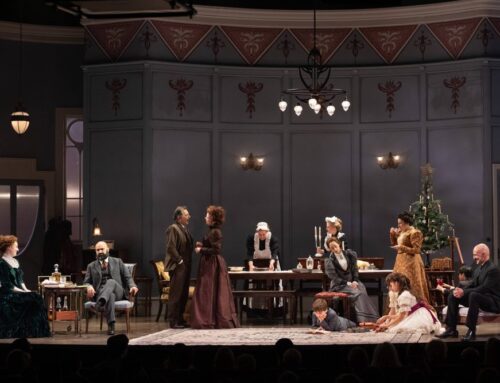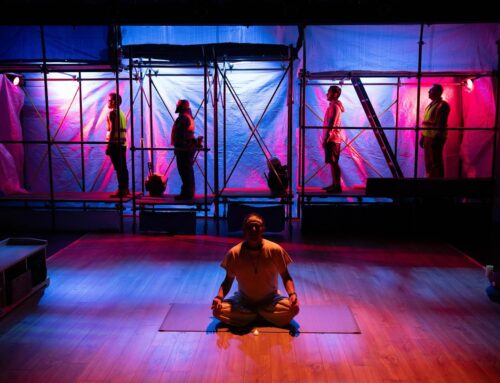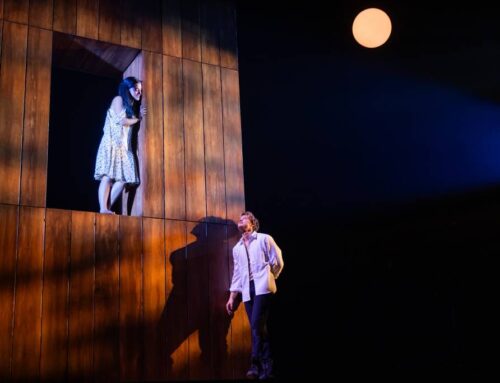 There is no balder, fresher medium than theater to communicate personal reality, warm bodies right there on stage conveying flesh and blood experiences. In TRANS SCRIPTS, PART I: THE WOMEN, now having its US premiere on the American Repertory Theater’s mainstage, playwright Paul Lucas leads us on an exploration of what it is to be “transgender.” The means are simple and direct, the results fascinating and revelatory. These stories are the result of four years of interviews that the playwright conducted with trans individuals all across America, Australia, and the UK. He had one simple request: “Tell me your story.” And they did.
There is no balder, fresher medium than theater to communicate personal reality, warm bodies right there on stage conveying flesh and blood experiences. In TRANS SCRIPTS, PART I: THE WOMEN, now having its US premiere on the American Repertory Theater’s mainstage, playwright Paul Lucas leads us on an exploration of what it is to be “transgender.” The means are simple and direct, the results fascinating and revelatory. These stories are the result of four years of interviews that the playwright conducted with trans individuals all across America, Australia, and the UK. He had one simple request: “Tell me your story.” And they did.
As the evening began, seven women walked out in front of a red curtain and seated themselves on stage. One by one they began at the beginning– when they first knew or became aware that they did not feel inside like the gender they had been assigned outside.
The stories evolve chronologically from person to person, and are grouped like chapters with headings projected above the stage; these headings chart their evolution on the journey to selfhood. The characters are diversified across age, race, ethnicity, class; some are plain, others flamboyant, and all of them are incredibly vivid.
There’s Tatiana (Bianca Leigh) a beautiful ex-dominatrix; Sandra (Eden Lane) who’s dressed as a socialite but grew up fixing cars; Dr. Violet (Jack Wetherall) a British physician who transitioned at age 68; there’s clog-wearing, barefaced Australian Josephine (Marlo Bernier) who just wants to blend in; Zakia (Matthew Hancock) is a beauty queen with drama to spare; Luna (MJ Rodriguez) is a sassy, street smart Latina; and finally Eden (Rebecca Root) who bears the scars of physical childhood abuse, an experience in one form or another that many of these women share.
There is little stagecraft– a disco ball, a change of lighting, or a sound effect. Jo Bonney’s direction puts the focus right where it belongs. The drama is in the stories: how funny, painful, absurd, tender, and how true. These women all become incredibly expressive and dear to us.
We gradually come to know each character and grasp that there are as many stories of the transgender experience as there are people. Any people. Anywhere–and that we all have narratives, stories we tell ourselves or stories the culture tells us about who we are supposed to be. This is the universal condition, and as different as my own experience of sexuality and gender is from the characters on that stage, the closer I listened, the more I identified.
I learned a lot. I had no idea if all, or which, or, for that matter, if any of the actors onstage were trans or not. I felt that underscored the point of the evening, which was NOT to make assumptions about who anyone was or draw conclusions about them based on some prescribed definition of binary sexuality. I was not sure who was behind the mask of each character– male, female, or intersex (which the show makes clear is now preferred to hermaphrodite). In fact, the show is remarkable for pointing up the inherent theatricality of everyday life given the masks we wear and the roles we are assigned by the culture on the basis of our skin-deep differences. That we have a right to choose our own masks, or no mask at all, has never been made so clear.
I learned that “gender” and “sex” are not the same thing; neither are “transgender” and “transexual.” I learned that for some trans women (and Lucas focused here on women) having a physical sex change is not as important –or for some, important at all–as it is to others.
It’s clear that being feminine has nothing to do with wearing blue eye shadow and heels, and that changing your sex does not change your sexual preference. But I was not aware of the history of tension between the trans and gay communities, and that these days some object to a current narrative which says that transgender is not a transition at all, but rather becoming who you really always were. Or not. And on and on and on.
And finally I was reminded, how precious our stories are to ourselves. No single character when asked, would trade places or the richness of their personal experience– however difficult and painful– for anyone else’s.
The show is an education and a refreshment. The gates have been flung open and however discouraging the current political climate, the prevailing winds seem to be moving us, inescapably, toward a wider horizon, and an enormous breadth of variation along an infinite continuum of diversity in everything including sexuality, gender roles, identity. The closer we look, the more varied the palate. This show offers an unsentimental yet generous, uncensored look at reality, and the fact is–despite opinions to the contrary–there is no alternative: all of us are in transition becoming ourselves. MUST SEE: TRANS SCRIPTS, PART I: THE WOMEN through FEBRUARY 5 at A.R.T.






Leave A Comment
You must be logged in to post a comment.